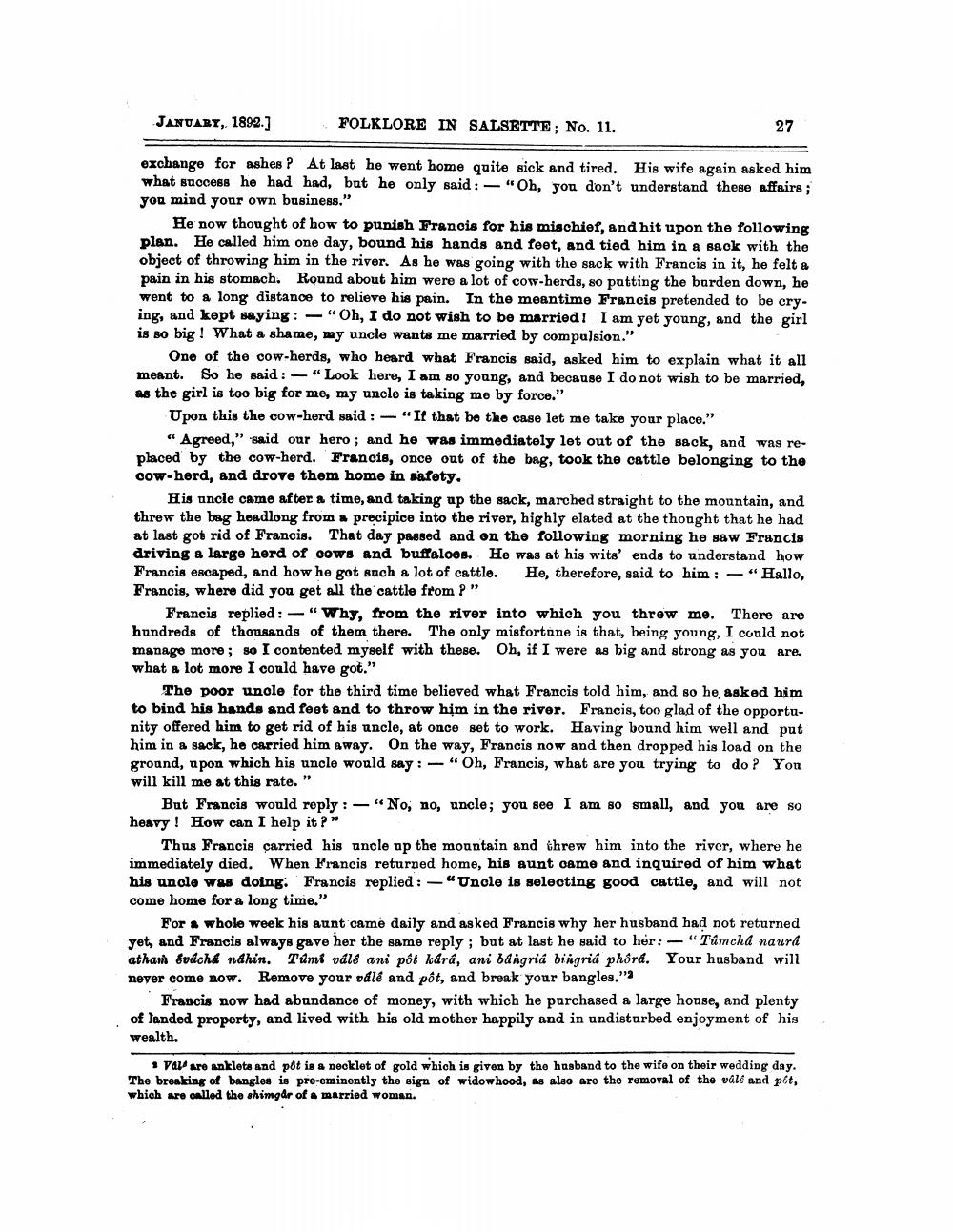________________
JANUARY, 1892.]
FOLKLORE IN SALSETTE: No. 11.
27
exchange for ashes P At last he went home quite sick and tired. His wife again asked him what success he had had, but he only said: - "Oh, you don't understand these affairs ; you mind your own business."
He now thought of how to punish Francis for his mischief, and hit upon the following plan. He called him one day, bound his hands and feet, and tied him in & back with the object of throwing him in the river. As he was going with the sack with Francis in it, he felt a pain in his stomach. Round about him were a lot of cow-herds, so patting the burden down, he went to a long distance to relieve his pain. In the meantime Francis pretended to be cry. ing, and kept saying: "Oh, I do not wish to be married! I am yet young, and the girl is so big ! What a shame, my uncle wants me married by compulsion."
One of the cow-herds, who heard what Francis said, asked him to explain what it all meant. So he said: - "Look here, I am so young, and because I do not wish to be married, as the girl is too big for me, my uncle is taking me by force."
Upon this the cow-herd said: “If that be the case let me take your place."
« Agreed," said our hero ; and he was immediately let out of the sack, and was replaced by the cow-herd. Francis, once out of the bag, took the cattle belonging to the cow-herd, and drove them home in safety.
His uncle came after a time, and taking up the sack, marched straight to the mountain, and threw the bag hoadlong from a precipice into the river, highly elated at the thought that he had at last got rid of Francis. That day passed and on the following morning he saw Francis driving a large herd of cows and buffaloes. He was at his wits' ends to understand how Francis escaped, and how he got such a lot of cattle. He, therefore, said to him: – “Hallo, Francis, where did you get all the cattle from P"
Francis replied: -“Why, from the river into which you throw me. There are hundreds of thousands of them there. The only misfortune is that, being young, I could not manage more; so I contented myself with these. Oh, if I were as big and strong as you are, what a lot more I could have got."
The poor unole for the third time believed what Francis told him, and so he asked him to bind his hands and feet and to throw him in the river. Francis, too glad of the opportunity offered him to get rid of his uncle, at once set to work. Having bound him well and put him in a sack, he carried him away. On the way, Francis now and then dropped his load on the ground, upon which his uncle would say: "Oh, Francis, what are you trying to do? Yon will kill me at this rate."
But Francis would reply :-“No, no, uncle; you see I am so small, and you are so heavy! How can I help it?"
Thus Francis carried his ancle up the mountain and threw him into the river, where he immediately died. When Francis returned home, his aunt oame and inquired of him what his uncle was doing: Francis replied: - "Uncle is selecting good cattle, and will not come home for a long time."
For a whole week his aunt came daily and asked Francis why her husband had not returned yet, and Francis always gave her the same reply; but at last he said to her: - "Túmchá naura atham éváché ndhin. Tumi válé ani pột kdrá, ani bangria bingria phora. Your husband will never come now. Remove your vale and pôt, and break your bangles."
Francis now had abundance of money, with which he purchased a large house, and plenty of landed property, and lived with his old mother happily and in andisturbed enjoyment of his wealth.
· Vavere anklets and pôt is a necklet of gold which is given by the husband to the wife on their wedding day. The breaking of bangles is pre-eminently the sign of widowhood, as also are the removal of the vale and pot, which are onlled the shimgar of married woman.




